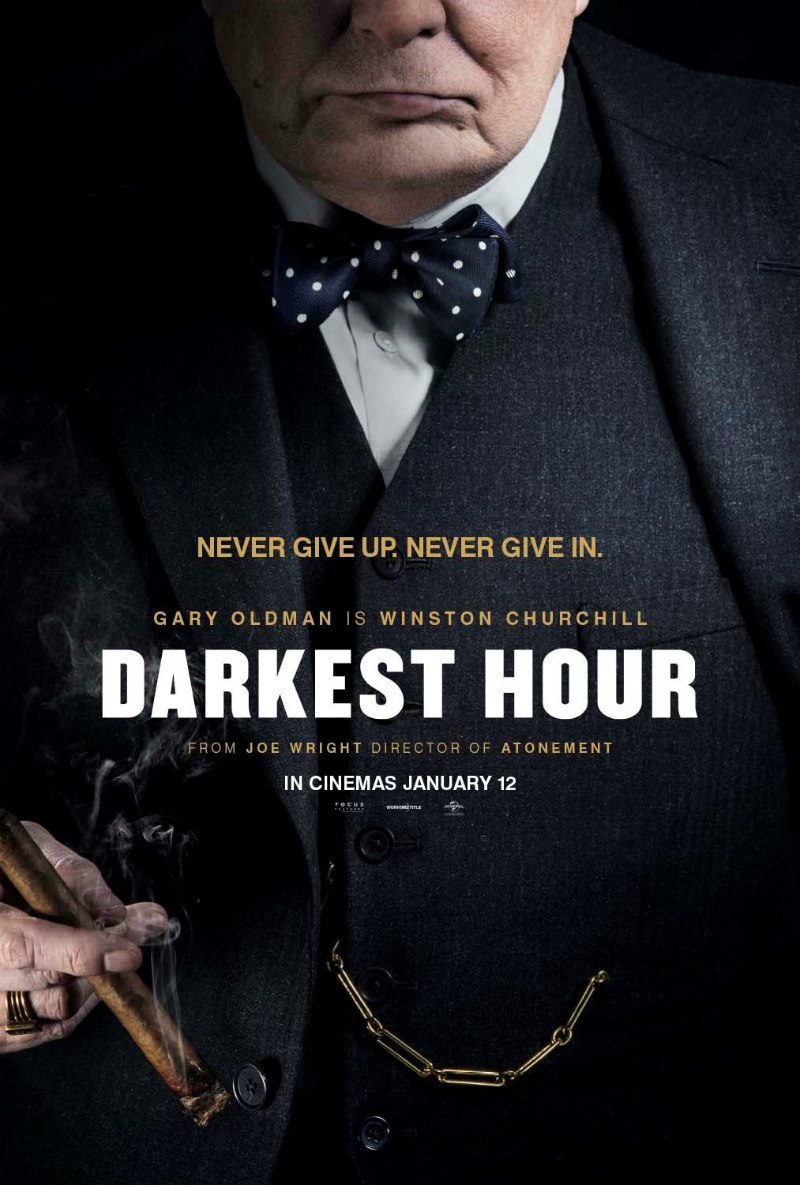
Review by Eric Hillis
Directed by: Joe Wright
Starring: Gary Oldman, Lily James, Kristin Scott Thomas, Ben Mendelsohn, Stephen Dillane

Roughly five minutes into his performance as Winston Churchill in Joe Wright's wartime biopic, Darkest Hour, I forgot I was watching Gary Oldman. It was only about a half hour later - when a photographer's flash captured the portly PM in a monochrome freeze frame, and Oldman's two-fingered salute and defiant expression gave the impression that Wright had subliminally edited a frame of the actor's turn as Sid Vicious in Alex Cox's Sid & Nancy into his film - that I was briefly reminded I was watching an iconic actor, rather than an iconic figure. Awards season hype should always be mistrusted, but Oldman really is doing something special here, embedding himself into a subconscious history most of us never lived.

Wisely ditching a cradle to grave format, Wright - like Jonathan Teplitzky, director of this year's earlier Churchill - narrows his film's focus to a few monumental days in the British Prime Minister's stewardship, beginning as he takes over from Neville Chamberlain and playing out over the run up to the evacuation of Dunkirk (I think there may have also been a movie about that event this year).
[ READ MORE: Now on Netflix - Phantom Thread ]
Oldman became a star thanks to his turn as Sid Vicious, so perhaps it's fitting that the role that landed him his first Oscar sees him essay another anti-establishment figure who spent most of his waking hours in a state of inebriation. Uncouth by the stuffy standards of Westminster, Churchill makes enemies of the Royals and the Church, both of whom are happy to entertain the idea of entering into peace talks with Hitler. Churchill is initially having none of it, but as his cabinet gangs up on him and Roosevelt refuses to come to Europe's aid, he's forced to consider the inconsiderable.

Of course, we all know how this ends, and if you don't, you might want to consider why you're reading this review in English rather than German. The question thus isn't what happened but how, and in Wright's hands, the how is something splendid. I've struggled with the director in the past, but Darkest Hour shows a new, mature side of Wright, exhibiting a sense of visual storytelling that at times recalls Spielberg at his best.
[ READ MORE: Now on Netflix - Shadow ]
Both Wright and Teplitzky's films made a central figure out of Churchill's personal stenographers, but the latter used his as a lazy and convenient sounding board for Brian Cox's Churchill to verbalise his thoughts. Compare this to the cinematic manner in which Wright deploys Lily James as Elizabeth Layton, drawing the humanity out of her boss's gruff exterior, not by her words, but merely by her presence. Both movies have scenes in which Churchill realises his secretary has a personal interest in the decision he must make (here it's a dead brother, killed fighting in France), but in Darkest Hour Layton keeps her emotions in check, and we see on Churchill's face his realisation that should he choose for Britain to fight, his people can carry the load.

In another stunning moment of subtle visual craft, Layton finds herself for the first time confronted with a giant map of Europe, a small group of blue pins surrounded at Dunkirk by a continent-sized horseshoe of red pins, and her fingers caress the blue pins as she stifles her emotions. You can tell a lot of money has been pumped into Darkest Hour, and every penny is on the screen, but its best moments are minute masterclasses in how to convey something big with a small gesture. The man who turned a two-fingered salute into a symbol of strength and defiance would approve.

Darkest Hour is on Netflix UK now.
"A biting statement on how the wealthy are often oblivious to those living beneath them."— 𝕋𝕙𝕖𝕄𝕠𝕧𝕚𝕖𝕎𝕒𝕗𝕗𝕝𝕖𝕣.𝕔𝕠𝕞 🎬 (@themoviewaffler) January 18, 2020
PARASITE is in UK/ROI cinemas February 7th.
Read @hilliseric's reviewhttps://t.co/uolI5sIwPd pic.twitter.com/c2s9WNRGm0

